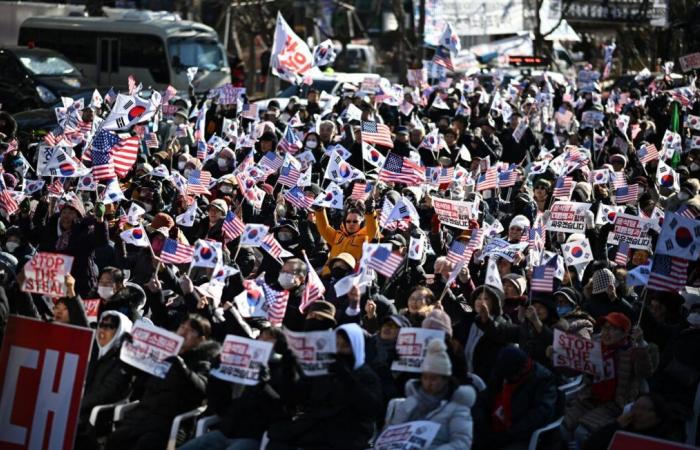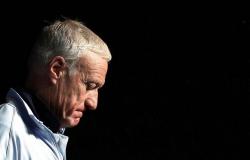The political crisis reached a new peak in South Korea on Friday. Under an arrest warrant after briefly imposing martial law in early December, President Yoon Suk Yeol should have been arrested by investigators at his home. But the bodyguards of the deposed president intervened, and the police finally left.
The current order issued by a court, the first to target a sitting head of state in the country's history, runs until Monday. Yoon's arrest is now a hypothesis, and the political future of the country is written in the conditional. This Saturday, a demonstration in support of Yoon Suk Yeol brought together thousands of South Koreans in the streets of Seoul. While uncertainty reigns, 20 Minutes draws up possible scenarios for the future.
A new arrest attempt?
Until the deadline, investigators can try again to seize Yoon Suk Yeol, cloistered at his home in central Seoul. Their first attempt on Friday ended in failure, with some 200 soldiers and presidential guards blocking the operation, marked by unsuccessful negotiations and altercations before finally being called off in the middle of the day.
If Yoon Suk Yeol, targeted in particular for “rebellion”, was arrested, he could be kept in detention for 48 hours. The investigators would then have the choice between requesting another, so-called formal, warrant to keep him in custody longer, or releasing him. The former star prosecutor's lawyers describe the current warrant as “illegal” and promise to initiate proceedings to challenge it. If the mandate expires, the agency can always request a new one, for a period of validity of seven days.
A “formal” arrest warrant?
The police could also directly request this “formal” arrest warrant, which is more restrictive for Yoon Suk Yeol, who would be directly placed in detention for more than 48 hours. According to specialists, this scenario is not improbable given the fact that the deposed president rejected three summons for questioning before finally being targeted by the current mandate, which he also rejects.
A formal arrest warrant is usually issued when “a suspect refuses to cooperate with the investigation,” explains political commentator Park Sang-byung. Yoon Suk Yeol also “encouraged his supporters” to support him, which could be perceived by the courts as “recognition of the criminal charges brought against him”, he thinks. But here again, the application of such a mandate remains uncertain as long as Yoon remains confined to his home and protected by his guard, composed in particular of soldiers.
An intervention from the interim president?
Faced with obstruction by the bodyguards, the IOC and the main opposition force, the Democratic Party, asked interim President Choi Sang-mok to force them to cooperate. “It is, in practice, impossible to execute the arrest warrant as long as Yoon Suk Yeol security officials continue their protection,” lamented the IOC in a statement.
But Choi Sang-Mok, who has not yet reacted to Friday's events, is already in a delicate political situation and it is “unlikely” that he will grant the Bureau's request, said Shin Yul, professor of political science. at Myongji University. He is particularly criticized by Yoon's People Power Party (PPP) for having appointed two new judges to the Constitutional Court, which had three vacant seats out of nine.
Wait for June and the decision of the Constitutional Court?
The Court must confirm or invalidate by mid-June the dismissal of Yoon Suk Yeol, adopted by deputies on December 14. According to experts, investigators would have much less difficulty arresting him if his title were taken away. Pending the decision, he is only suspended and officially remains the titular president. The delay until the verdict could be long and it is possible that the proceedings involving Yoon Suk Yeol will drag on, even if the Court intends to conduct a speedy trial, given the seriousness of the case.
The latest news on South Korea
For the person's lawyers, the judges must on the contrary absolutely use all the time allocated to them, calling on them to examine in detail “the circumstances which led to the declaration of martial law”. A shocking measure that Yoon Suk Yeol continues to defend, despite the protests and the institutional chaos it has generated.






